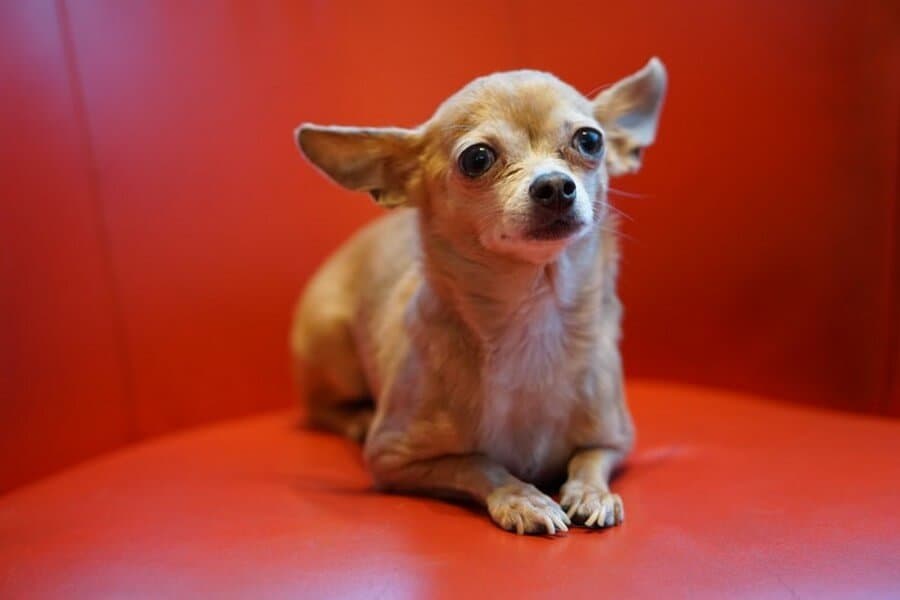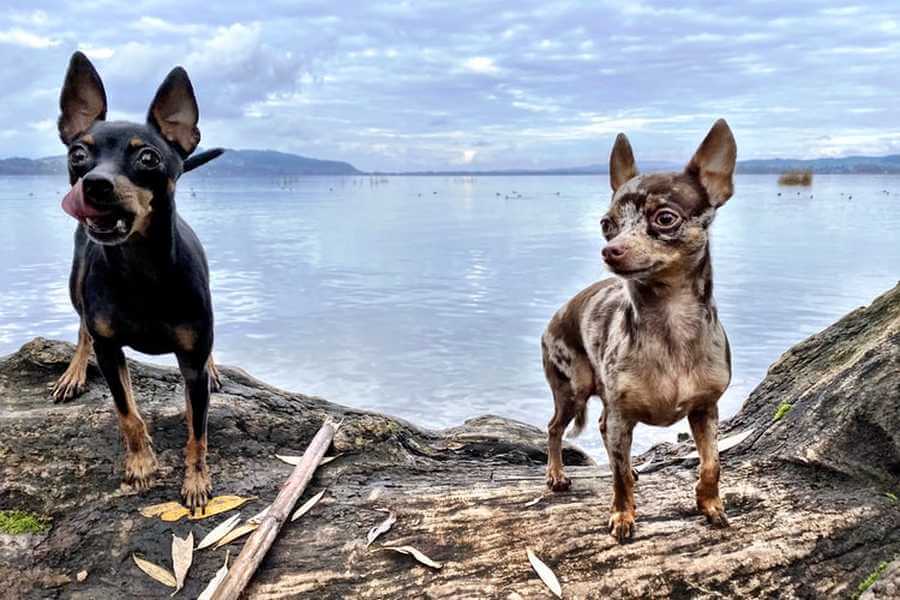Anyone who has owned a Chihuahua knows that they are a breed all of their own. Although they are the smallest dog breed, they have a huge personality that makes them a fun and entertaining addition to your family. They just love being with their people so you get a lot of affection back, which means they can be a true companion.
As with any breed, however, there are some problems with Chihuahuas that any prospective owner should make themselves aware of before they go ahead and bring one into their family.
Chihuahuas can be wilful, mistrustful, aggressive, destructive, spoilt, vulnerable to injury, prone to separation anxiety, barking and howling, escaping, and coprophagia. They are at risk of epilepsy, respiratory problems, heart disease, gum disease, patella luxation, and neurological diseases.
Of course, when you lay it all out like that it can seem like getting a Chihuahua is the worst idea on earth, but all dog breeds have a list of potential problems that can be as long or even longer than the Chihuahua’s.
The important thing is understanding the problems that are typical with the breed you’re looking at and deciding whether those problems can be a good fit for your family, lifestyle, and circumstances.
Chihuahuas are a popular dog breed and with good reason. They have that mix of being small enough to be a companion dog but also have the athleticism to be able to compete in agility and obedience competitions.
They are the Kennel Club’s smallest official dog breed and they recognize two different types of Chihuahua: the smooth coat and the long coat. Apart from the coat, these breeds have all of the same positives and negatives.
| Height – 6-9 inches tall | Weight – 3-6 pounds | Lifespan – 10-18 years |
Chihuahuas are well-loved companions because they are fun and have such big personalities. They are also intelligent and extremely loving. They really attach themselves to their closest people and they can be a constant source of affection if you want them to be. But let’s take a look at some of the problems you might encounter when you own a Chihuahua.

1. Stubbornness Of A Chihuahua
Chihuahuas can be very stubborn. While they are intelligent enough to learn their training easily, when it comes to implementing it they may simply choose not to. The best way to deal with this is to use plenty of positive reinforcement and to find a way to make the training fun.
They can also become spoilt and demanding if they don’t have strict ground rules in place so it is a good idea to establish these early on.
2. Chihuahuas Are Escape artists
It can be easy to forget how small a Chihuahua is, especially when you are dog-proofing your house and garden. Chihuahuas can slip through gaps that are so small you may not even notice they are there, and if they can escape they will go right ahead and do it.
3. Chihuahuas Are Mistrustful Of Strangers
Chihuahuas are one of the top watchdogs out there. This might seem strange given how small they are since they wouldn’t be able to scare off anyone, but what you’re really looking for in a watchdog (as opposed to a guard dog) is how loud their bark is. And a Chihuahua’s bark is very loud.
Of course, it doesn’t take a genius to realize that this positive trait can easily become a negative one when they are barking at any stranger that comes to your door or into your home.
4. Chihuahuas Get Destructive When Bored
Chihuahuas are one of those breeds that will destroy your possessions if they get bored or lonely, and this can be extremely stressful. Finding a good mix of toys that challenge your Chihuahua is a good way of diverting their attention and keeping them amused. There are all sorts of puzzle toys out there that can keep your Chihuahua busy and engaged.
5. Chihuahuahs Can Be Aggressive To Other Dogs
It is often said that Chihuahuas forget how small they are, and nowhere is this more obvious than when you encounter another dog out on a walk. A Chihuahua will square up to a dog 5 times their size and feel absolutely confident that they will be able to hold their own.
This can make it awkward when you’re out walking and can put your Chihuahua in a dangerous situation if the bigger dog is aggressive back. Early socialisation with other dogs is key to trying to get around this problem, as is ensuring that you have control over your Chihuahua when you are out.
6. Chihuahuas Are Vulnerable Because Of Their Size
The Chihuahua’s small size makes them vulnerable to injury from all sorts of sources. They are usually not given to homes that have children under the age of 8 because small children can accidentally injure them while they are playing.
It also means that they shouldn’t be left out in the garden on their own because they can be attacked by hawks and other birds of prey, as well as other animals. They are prone to getting cold and shivering because they are so small so will need a coat when the temperature is cooler.
If they are excited when they are out, they can walk erratically around your feet which puts them at risk of being stepped on and sustaining an injury.
7. Chihuahuas Are Prone To Separation Anxiety
They absolutely love to be around their favourite people, but this can also mean that Chihuahuas are prone to separation anxiety when left alone for long periods. They could bark and howl incessantly while you are out of the house (which could be a problem for your neighbours), they could become destructive, and they could foul in the house, or even self-harm.
Separation anxiety is a difficult problem to fix, although it can be done with patience and time. It is usually better to be in a position where someone will be at home with the Chihuahua for the majority of the time so that they don’t get separation anxiety in the first place.

8. Coprophagia In Chihuahuas
If you have never heard of coprophagia, you should count yourself lucky. It is a problem behavior often seen in Chihuahuas that involves eating their own or other dogs’ feces. Of course, this isn’t just disgusting, it can also cause them health problems so it is a behavior that really needs to be fixed. Sometimes it is triggered by a nutritional deficiency so a trip to the vet is a good first step.
What Are Common Health Problems In Chihuahuas?
In general, Chihuahuas are considered a healthy breed. As with any pure breed, however, they can be prone to certain health conditions (although they are at much less risk than some of the other less healthy breeds).
These health problems can include:
- Epilepsy – recurrent seizures are a common problem with chihuahuas
- Respiratory problems – weak cartilage rings can lead to trachea collapse, which is treatable
- Heart disease – PDA (where the vessel between the two parts of the hearts doesn’t close properly) is found in chihuahuas and it can put a strain on the heart
- Gum disease – small dogs are prone to gum disease because their mouths are so small
- Patellar luxation (dislocation of the knee cap) – this is common in many of the small toy and companion dog breeds, including chihuahuas
- Neurological problems, including atlantoaxial instability, ceroid lipofuscinosis, congenital hydrocephalus, necrotizing meningoencephalitis, and neuronal dystrophy
- Congenital deafness – more common in dogs with white pigmentation
- Muscular dystrophy
Whenever you are picking out a dog, you should always make sure that you can see the parents and get a thorough medical history for both. You should request any paperwork related to genetic testing that the breeder or shelter has.
Many of the health problems that afflict purebred dogs are related to genetics, so having a good understanding of the family history and, ideally, specific genetic testing for the most common problems should set your mind at ease that the dog you take home isn’t at risk.

What Do Chihuahuas Usually Die From?
The most common cause of death for Chihuahuas is cardiovascular/heart disease, but this is most common in senior dogs that are over 14 years of age. The heart is a hardworking organ and it can only function as it should for a limited amount of time.
So, in other words, the most common cause of death for Chihuahuas is old age. This is reassuring because it means that they aren’t as susceptible to health problems as some other breeds, and there is a good chance that your Chihuahua will live to a ripe old age after having led a fun and happy life.
The second leading cause of death is trauma, which really highlights just how vulnerable Chihuahuas are because of their size. As a Chihuahua owner, you always have to be alert and conscious of the environment that your Chihuahua is in to make sure that they don’t come to any harm.

The Overall About Chihuahuas
Having a Chihuahua as part of your family can be rewarding, fun, and can bring love and joy to your lives. These little firecrackers do have some common behavioral problems that you should be aware of before you bring one home, so that you can be sure that you will be able to dedicate the time to handle them and that they will be able to fit into your lifestyle.
Chihuahuas are less prone to disease than some other purebred dogs, but they are still susceptible to certain health conditions. It is always a good idea to do your research about the family history and genetics before you choose a dog to take home.
More Pages On Dogs
There are so many factors to deciding what type of dog is right for you, and one stumbling block that can be often overlooked is the amount of shedding. Cleaning up dog hair is a pain. It can get...
Dogs are a common household pet for a lot of reasons. They are chosen to become apart of someone's family for comfort and sometimes even protection. Worldwide, there are over 300 recognised dog...


